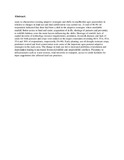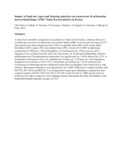Location
Our Vision is to be a world-class university committed to scholarly excellence.
Our Mission is to provide quality university education and training and to embody the aspirations of the Kenyan people and the global community through creation, preservation, integration, transmission and utilization of knowledge.
Core Values
In order to realize the above vision and mission, certain shared values shall be nurtured. There is great need for the University to be guided by the right values derived from the virtues and moral standards of the Kenyan and wider society.
Core Functions
Teaching and Learning: The university offers innovative , relevant and market driven academic programmes , both at undergraduate and postgraduate levels with inbuilt quality control systems the university also provides an environment and policy framework for undertaking high quality and relevant research
Members:
Resources
Displaying 96 - 100 of 298Impacts Of Land Cover Change Scenarios On Storm Runoff Generation: A Basis For Management Of The Nyando Basin, Kenya
The effects of conceptual land cover change scenarios on the generation of storm runoffs were evaluated in the Nyando Basin. The spatial scenarios represented alternatives that vary between full deforestation and reforestation. Synthetic storm events of depths 40, 60 and 80mm were formulated according to the rainfall patterns and assumed to have durations corresponding to the runoff times of concentration.
The Impact of HIV/AIDS on Land Rights. Case Studies from Kenya.
Effect of land use changes on adaptive strategies for smallholder agro-pastoralists in Kenya
study to characterize existing adaptive strategies and shifts in smallholder agro-pastoralists in relation to changes in land use and land subdivisions was carried out. A total of 48.9% of respondent indicated that there had been a shift in the adaptive strategies where unreliable rainfall, better access to land and water, acquisition of skills, shortage of pastures and proximity to wildlife habitats were the main factors influencing the shifts.
The problem of land rights administration in Kenya
This study conducts an academic and practical surgery of the problem of land rights
administration in the pre-colonial, colonial, independent and modern Kenya. At the core of the
statement of the problem of the study lie issues of land tenure and sanctity of land titles in
Kenya. Amazingly, the issues that form the nuclei of the “Land Question” in Kenya are closely
intertwined with the socio-economic and political climate prevailing in the country. Hence, the
study confronts the problem from the policy, legal-constitutional and institutional dimensions.
Impact of land use types and farming practices on occurrence of arbuscular mycorrhizal fungi (AMF) Taita-Taveta district in Kenya
A study was undertaken along land use gradients in Taita-Taveta district, southeast Kenya to evaluate the occurrence of arbuscular mycorrhizal fungi (AMF) in seven land use types (LUT). The gradient was from indigenous forest (IF) to croplands with coffee (CO), maize (MA), horticulture (HT), napier (NA) and planted forest (PF). A total of 12 AMF morphotypes comprising of 4 Glomus, 1 Claroideoglomus, 5 Acaulosporaceae, 1 Racocetra sp. and 1 Gigaspora were isolated from the study site. Occurrnace of






